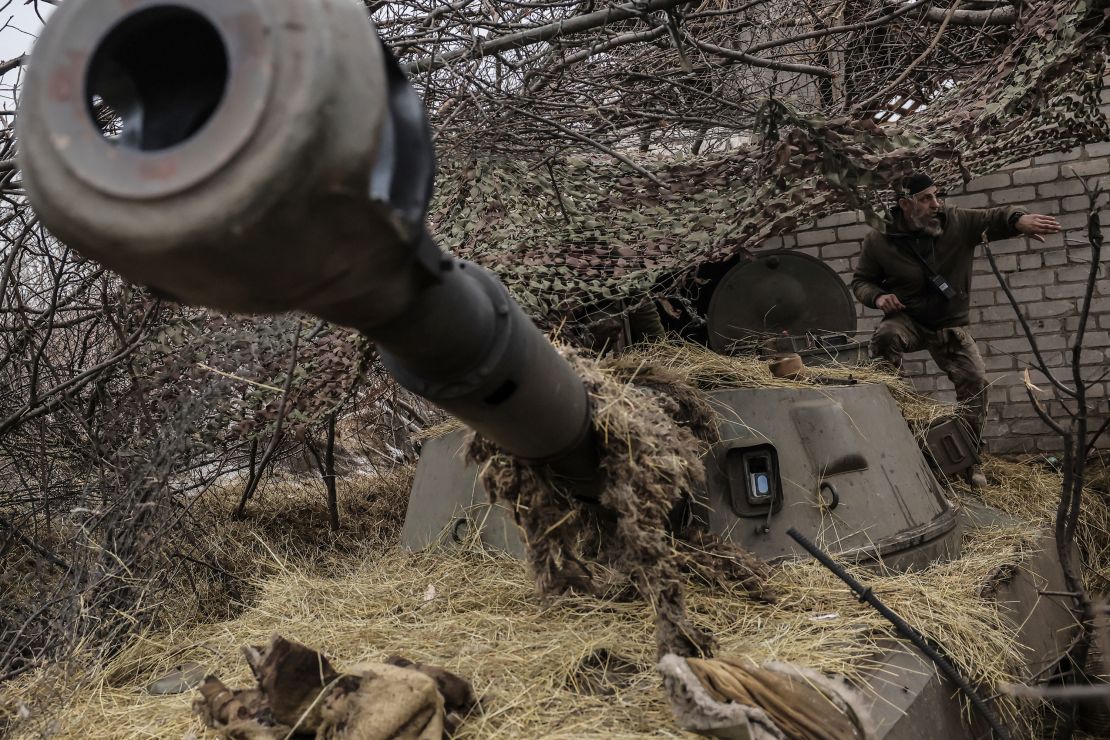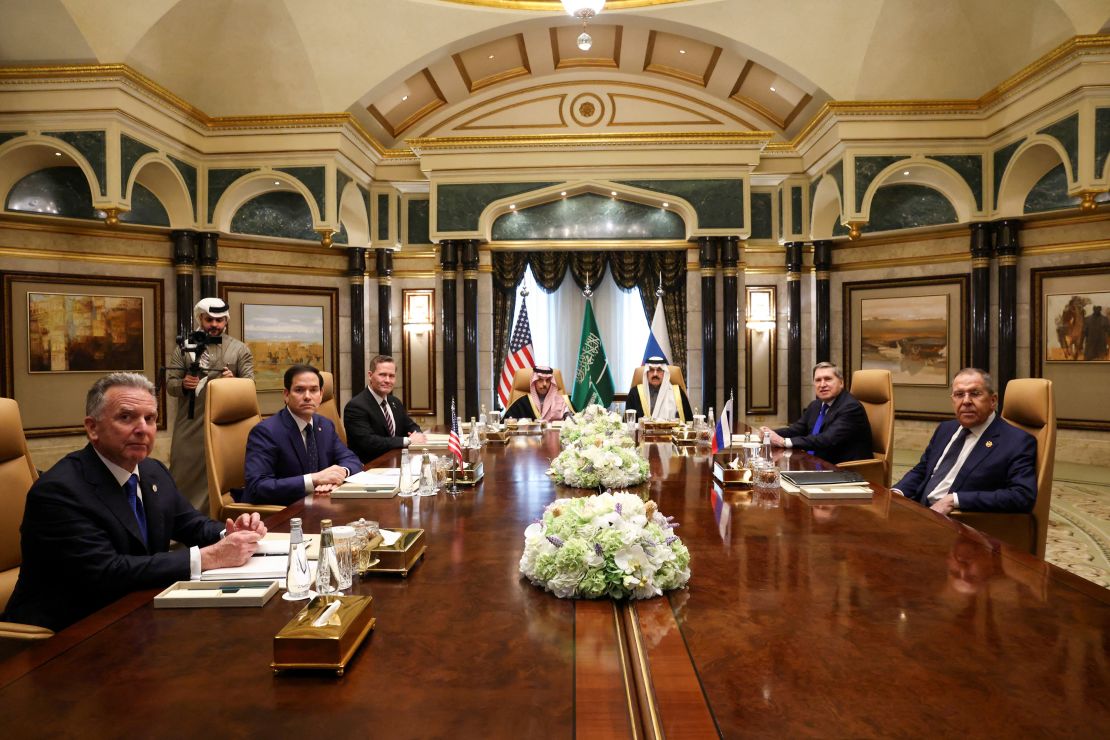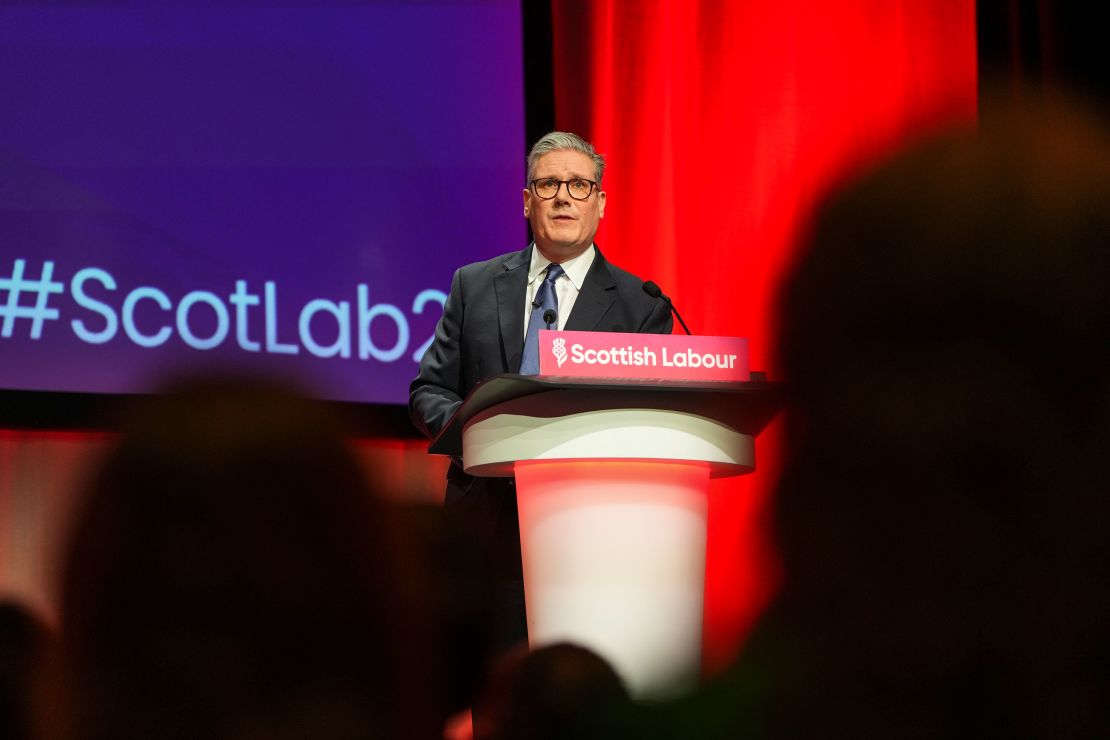CNN
—
An existential week is ahead for Ukraine and the West.
The leaders of Europe’s two nuclear powers are rushing to the White House to try to reclaim a central role for themselves and for Ukraine after they were cut out of US-Russia talks on ending the war.
President Donald Trump sent shock waves through the transatlantic alliance last week and played into Russian President Vladimir Putin’s hands while attacking Ukrainian President Volodymyr Zelensky and trashing the truth about how the war started.
French President Emmanuel Macron will visit Trump on Monday — the third anniversary of Russia’s brutal invasion of Ukraine, a sovereign democracy, which has killed tens of thousands of civilians and left Putin and his forces accused of war crimes.
British Prime Minister Keir Starmer will follow on Thursday, in the most treacherous moment yet of his young premiership, with large gaps opening between Washington and London on the reality of Ukraine’s plight.
Britain and France are drawing up plans for a European “reassurance force,” perhaps including up to 30,000 troops that could deploy to Ukraine in the event of a peace deal. The idea, however, faces massive barriers — not least that a deal that both Zelensky and Putin could agree to sign seems highly unlikely. And Starmer has already warned that the force couldn’t work without a US “backstop,” which could potentially include security guarantees, American intelligence cooperation, air support and heavy lift transport. A key takeaway this week will be whether Trump has any interest given Russia’s opposition to NATO troops in Ukraine under any flag.
As Trump leads the US in a new direction on Ukraine, historic schisms are opening that threaten the transatlantic alliance and the post-World War II order. Trump treats America’s longtime friends — who have failed to deliver on calls by successive presidents to spend more on defense — as adversaries. And the new administration has already shattered years of European assumptions about America’s security guarantees to the West.

The president’s siding with Putin over Zelensky — and his bid to extract a punitive deal to export Ukraine’s rare earth minerals as a payback for past US aid — shocked transatlantic allies. Defense Secretary Pete Hegseth’s warning in Brussels this month that Europe must take primary responsibility for its own security called into question NATO’s creed of mutual defense. And Vice President JD Vance’s slam of European governments and values in a speech in Munich was seen in Europe as an attempt to destabilize continental leaders on behalf of far-right populists who take ideological inspiration from the MAGA movement.
In an extraordinary comment that captured the historic times, the likely next leader of Germany Friedrich Merz, leader of the conservative Christian Democratic Union that won Sunday’s general election, according to exit polls, set out the new government’s program.
“My absolute priority will be to strengthen Europe as quickly as possible so that, step by step, we can really achieve independence from the USA,” Merz said at a televised roundtable after the exit polls also showed huge gains for the extreme-right AfD party.
“I would never have believed that I would have to say something like that on television. But at the very least, after Donald Trump’s statements last week, it is clear that the Americans — at least this part of the Americans in this administration — are largely indifferent to the fate of Europe,” Merz said.
‘We came very, very close to signing something’
Trump appears to be aiming for a lightning-fast peace agreement — similar to the velocity of his domestic transformation a month after his return to the White House.
His Middle East envoy Steve Witkoff, who has a leading role in the Ukraine talks, on Sunday raised the prospect of a swift breakthrough following the meeting between US and Russian officials last week. “We came very, very close to signing something. And I think we will be using that framework as a guidepost to get a peace deal done between Ukraine and Russia,” Witkoff told CNN’s Jake Tapper on “State of the Union.”
He added: “The president understands how to get deals done. Deals only work when they’re good for all the parties. And that’s the pathway that we’re on here.”
Hegseth implied Sunday that Trump’s depiction of Zelensky as a “dictator” last week was meant to avoid annoying Putin in order to get concessions at the negotiating table. “Standing here and saying, ‘you’re good, you’re bad, you’re a dictator, you’re not a dictator, you invaded, you didn’t’ — it’s not useful. It’s not productive,” Hegseth said on “Fox News Sunday.”

But Sen. Jack Reed, the ranking Democrat on the Senate Armed Services Committee, accused Trump of “surrendering” to Putin. “This is not a statesman or a diplomat. This is just someone who admires Putin, does not believe in the struggle of the Ukrainians, and is committed to cozying up to an autocrat.” The Rhode Island Democrat added on ABC’s “This Week”: “Putin will not stop in Ukraine. He will begin in a campaign, both clandestine and in many cases overt, to undermine the other governments in Eastern Europe and it’ll create chaos.”
Trump’s turn against Ukraine and his rush to embrace Putin ahead of a potential summit in the coming weeks has Ukrainians and Europeans fearing that he simply plans to seal a deal with Russia and then impose it on Kyiv. That’s why Macron and Starmer will try to convince the president he will look bad if he fails to drive a hard bargain with Putin.
“What I am going to do is that I am going to tell him basically, you cannot be weak in the face of President Putin. It’s not you, it’s not your trademark,” Macron said, paraphrasing his message to Trump in a social media Q&A on Thursday.
An Elysée Palace official said that Macron shared Trump’s goal of ending Russia’s war of aggression and was bringing proposals that were reaffirmed in his talks with European leaders, particularly with the British. “He is traveling to Washington with this goal in mind, sharing this desire to end the conflict while making every effort to maintain our support for Ukraine, strengthen European security and ensure that Ukraine is fully involved in these efforts, and to ensure that Ukraine’s interests — which are ours as well — are fully taken into account.”
Starmer on Sunday laid out a tough pro-Zelensky approach, which conflicted with Trump’s position, a day after talking to the Ukrainian leader on the phone. “Nobody wants the bloodshed to continue. Nobody, least of all the Ukrainians,” Starmer said at the Scottish Labour Party conference in Glasgow. “But after everything that they have suffered, after everything that they have fought for, there could be no discussion about Ukraine without Ukraine, and the people of Ukraine must have a long-term secure future.”

The phrase “no discussion about Ukraine without Ukraine” encapsulated the principles of the Biden administration’s tight coordination with Europe and Kyiv over the war. But that consensus has been buckled by Trump. And Starmer will risk further angering the president before he arrives. Bridget Phillipson, a British Cabinet minister, told Sky News on Sunday that the UK government would unveil a new set of sanctions against Russia on Monday.
Trump says that Zelensky — a hero in the west for leading Ukraine’s resistance to Russia — didn’t deserve to be at the talks. “I’ve been watching for years, and I’ve been watching him negotiate with no cards. He has no cards. And you get sick of it,” Trump said on Fox News Radio’s “The Brian Kilmeade Show” Friday.
Trump also criticized his visitors. “You know, they haven’t done anything,” he told Kilmeade. “You know, Macron’s a friend of mine, and I met with the prime minister, and you know, he’s a very nice guy, but nobody’s done anything,” Trump said.
Macron may try to correct Trump on that point, one person familiar with the matter said. But the French president is most intent on managing the way forward, providing his view on how Europe can help assure Ukraine’s security, as long as it is incorporated into talks to end the war.
Starmer: The US is ‘right’ to complain about European defense spending
The French and British leaders will also arrive in Washington as Trump demands steep hikes in defense spending by NATO members, which would mean excruciating fiscal choices for governments saddled by constricted public finances. Both Macron and Starmer have spoken of the need for European nations to do more to protect the continent, but their capacity to act is likely to fall far short of the American president’s expectations.
Despite Starmer saying Sunday that Trump was “right” in calling for Europe to step up, Phillipson declined to say, for instance, whether her boss would tell Trump a target date for his government to raise defense spending to 2.5% of GDP. The US president has demanded 5%.
Both Macron and Starmer, who spoke by telephone Sunday, are expected to argue that Washington’s continued presence in Europe and security guarantees are critical to peace in the west, despite the Trump administration’s desire to pivot to the challenge posed by China.

The European message is going to be a tough sell to a transactional president who doesn’t appreciate alliances as a force multiplier for American power and who seems to prefer the company of autocrats to that of his fellow democratic leaders.
Macron has already tried to shape Trump’s thinking on Ukraine, arranging a three-way meeting with the then-US president-elect and Zelensky in Paris last December. Trump was respectful and “in listening mode” during the meeting, one official said, as Zelensky laid out the necessity of security guarantees for Ukraine once the war ends. Macron tried to impress on Trump that Putin had changed since he was last in office and warned that if Ukraine was defeated, the US could look weak to its other rivals — namely China.
But two months later, the talks do not appear to have left a lasting impression on Trump, given his comments of the last week. And European officials acknowledge it will be impossible to persuade Trump to abandon his erroneous views of the war, including that it was provoked by Ukraine or that the United States was conned into supporting a man he claims is a dictator.
Instead, they say, it will be more useful to look ahead, as Trump prepares to sit down soon with Putin and the contours of a possible peace agreement emerge.


